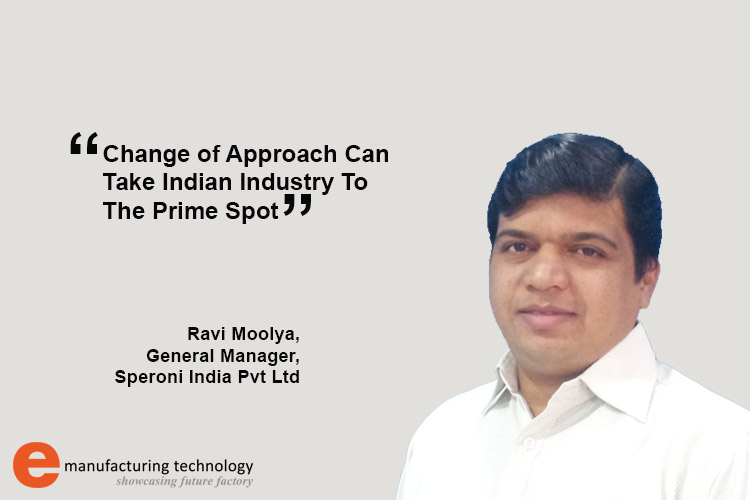“With the fast evolving technology, especially in the manufacturing sector, customers are looking for more value, less risk and better integration of process. So there is a need to change the manufacturing strategies that can result in improved performance thereby meeting the customer demands,” Ravi Moolya, General Manager, Speroni India Pvt Ltd, Pune.
India gaining ground
The 21st century led our nation to the global platform in terms of technological advancement. Many industries took this opportunity to project their capabilities on the global stage. They undertook modernisation drive, upgraded their manufacturing processes, embraced the changes with confidence and faced the challenges with courage. As a result, the ‘Made in India’ brand has undoubtedly gained better acceptability in the world market, than before. This is encouraging. Yet, we need to take little extra efforts to rub shoulders with world-class manufacturing giants.
Your take on ‘Let the technology overtake the manual processes’
India is a fast developing country with enormous growth potential. We are witnessing many changes as well as challenges. The manufacturing sector, in particular, is facing the challenge of higher quality and less through-put-time in manufacturing. Especially in the aerospace industry, auto sector and other precision manufacturing industries, huge investments have also been made on technology upgradation and automation. Manufacturing concepts are changing today. Managements are embracing the change by investing in top-class machine tools, software and tooling, but the work culture still remains the same. As a result, the return on investment is not achieved as desired and industry professionals hesitate to bring in big technology changes. Therefore, manual processes are still followed at many work places.
But considering the limitations of manual processes and the extent of losses incurred due to over-reliance on manual work, it is time to make conscious efforts to create proper work culture and spread awareness about the advantages of adopting the latest technologies. Reduction of manual work will reduce/ eliminate the chances of rejection, rework and while providing better quality.
India’s position on technology adoption
Well, in most of the industries the managements are ready to invest for high-end technologies, but at times the resources who are actually involved in utilising or putting it to use show cold shoulder to the management initiative due to the fear of losing their importance. But this cannot be blamed out rightly. Lot of effort needs to be put into education and awareness to create leaders at the bottom, but unfortunately the Indian industry in general is badly hit by the ‘chalta hai’ attitude. This attitude is spread across industries like an epidemic and is often the root cause of poor work culture. Decision makers at user level need to be encouraged for improvement.
In some industries good technology is sidelined due to management’s concern about the cost. As a result the quality is compromised and only make-shift solutions are adopted with less costs incurred. But with changing times, certain industries have successfully tried to overcome this problem by creating a better work environment and investing in training and spreading awareness among the employees. They are being involved in management policies, which have helped in creating a sense of accountability in them.
Challenges faced by Indian companies and how to overcome it
I believe, for any rotating Tool the nature of challenges is almost same, be it an industry in Europe, the US, Japan, China or India. What is different is the approach towards it. The western world focuses on quality solutions and long-term returns, whereas most of us look for cost-effective solutions. This approach prevents the high-end technologies to make way into the process. And perhaps this is the reason why few of the foreign manufacturers have discarded the low-end (compromised) technology provided by the Indian manufacturers, which has become obsolete in the western world long time ago.
Secondly, there are instances where people who possess manual skills, resist the change. But with intense pressure of globalisation and market competition the Indian Industry has to adopt the ‘process effective solutions’ as against the cost effective solutions in order to survive in the long run. We Speroni India take lot of effort in spreading awareness about the advantages of adopting the latest technologies and improve the process. We focus more at the bottom line than the top management. Our aim is to educate at user level.
Companies that have set an example
Usha Enterprise was using HSS small size cutter with conventional methods by number of passes and inspect & re-inspect method. For making grooves of 6 mm width with 50 microns tolerance took lot of time, efforts, operator dependency & rejection chances. If the slitting was 6 mm width they would use 2 mm tool then shift it and check the size. This whole process was time consuming & no quality assurance.
Once Usha Enterprises bagged order of 10 components that they had to deliver within 2-3 months time, they initiated talks with some reputed big names cutter suppliers. The reason being, the then existing conventional method and tool would have taken them 6-7 months to achieve the target. The company specifically used Speroni STP MAGIS 600 tool measuring machine, which could show the acuurate result and help Usha Enterprise finalise the cutter. After checking all the cutters available in the market only Walter’s cutter could meet the requirement of run out tolerance. The run out of Walter cutter was within the requirement and cutter’s reliability justifed the ROI. Speroni India helped them a great deal with setting tool within required tolerance, with the induction of new high-end technology, the cycle time was brought down to only 18 minutes, as against 20 hours.


